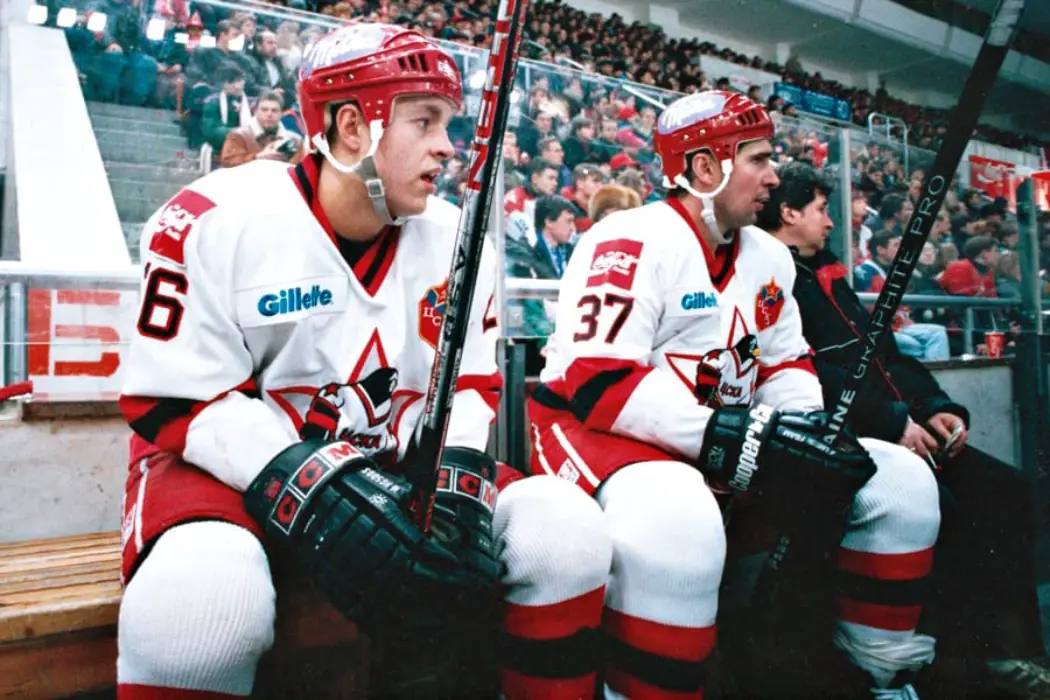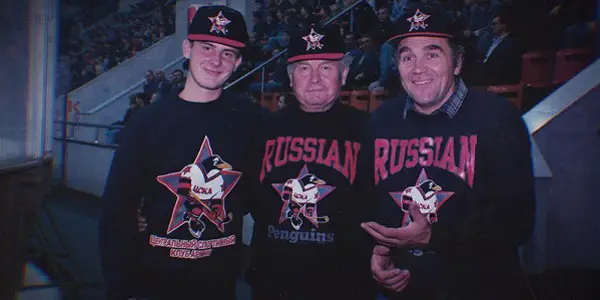RED PENGUINS: Filmmaker Gabe Polsky Returns to Russian Hockey

Lee Jutton has directed short films starring a killer toaster,…
Filmmaker Gabe Polsky is the son of immigrants from the Soviet Union and played hockey at Yale University, so it’s really no surprise that the world of Russian hockey has featured heavily in his work. His acclaimed 2014 documentary Red Army chronicled the rise and fall of the Soviet Union via the exploits of its national hockey team, which dominated the sport throughout the Cold War before infamously losing to the United States in what we U.S. fans have dubbed “the Miracle on Ice” at the 1980 Olympics.
Polsky’s latest, Red Penguins, essentially picks up where Red Army left off, telling the story of how the NHL’s Pittsburgh Penguins invested in a legendary Russian hockey team just after the dissolution of the Soviet Union. What follows is a story that epitomizes the old maxim of truth being stranger than fiction, a wild romp involving strippers, gangsters, oligarchs, and one dedicated American marketing rep who was willing to do whatever it took to make the so-called Russian Penguins a success – even as it became clear that not everyone in Russia was willing to embrace good old-fashioned American capitalism.
A New World
Following the end of the Soviet Union, the formerly Communist country was seen as ripe with opportunity for capitalist intervention by U.S.-based investors, including the then-owners of the NHL’s Pittsburgh Penguins. A joint venture was formed between the Penguins and the famed Red Army hockey team, thus known for its affiliation with the military. (Today the team is known as HC CSKA Moscow). As their relationship began, Penguins owner Howard Baldwin told Red Army general manager Valery Gushin, “Trust me, I’ll make you a good capitalist.” As Red Penguins shows us, Baldwin’s confidence was slightly misplaced.

To represent American interests – mainly, making money, but ideally recruiting a few good hockey players for the NHL while they were at it – the Penguins sent an eccentric young marketing whiz to Moscow in the hope of making the Russian Penguins a global sensation. That marketer, Steve Warshaw, is the main character of Red Penguins, and a character indeed he is. Short and wiry with a mop of curly hair standing on end, Warshaw appears to have an electric current running through his body 24/7; more than 25 years have gone by since he landed in Russia as a naive young man willing to try anything, yet his energy remains undiminished.
When Warshaw arrived in Moscow, the team’s famed arena, known as the Ice Palace, was falling apart, and the team barely had enough money for players to have their own jerseys. Warshaw proceeded to go hog wild in what was then dubbed by many “the Wild East” for the opportunities therein. When the circus was in town, Warshaw enlisted the trained bears to serve beer in the arena. He brought strippers up from the club beneath the Ice Palace (yup) to perform stripteases in team jerseys on the ice. He even managed to negotiate big advertising contracts for the Russian Penguins with a variety of Western brands, including Nike.
Eastern Promises
Warshaw essentially focused all of his energy on turning the Russian Penguins into a spectacle the likes of which the Russians had never seen – and initially, it worked. The arena, previously as quiet as a mausoleum, erupted with the energy of thousands of Russians looking for a good time and a distraction from the political and economic upheaval wracking the country. Disney’s Michael Eisner, who had just entered the hockey game in the U.S. with the NHL’s Mighty Ducks of Anaheim, expressed interest in partnering with the team. There was just one problem: the Russians themselves, particularly Gushin and famed coach Viktor Tikhonov, were less amenable to the American way than the Penguins had initially hoped.
The first half of Red Penguins feels as though it could easily be adapted into a narrative film by the likes of Adam McKay, a comedic whirlwind of adventure and experimentation as Warshaw embraces all of the risks and rewards that his project has to offer. (For the record, Ben Schwartz would make a perfect Steve Warshaw.) However, the second half is more reminiscent of the work of Martin Scorsese. From Gushin and Tikhonov skimming thousands off of the team budget to build a marble sauna in the Ice Palace to the gangsters who were so keen on taking control of the team that they literally shot down concessions workers outside the arena, the film takes a dark turn as it becomes clear that Russia is not the brand-new capitalist paradise the U.S. investors had thought.

As one of the many interviewees’ notes in Red Penguins, Americans hear mafia and they just think gangster families in the style of The Godfather. But in Russia, mafia means the entire system, from the top down. One could not even go to the Army – ostensibly the ones in charge of the team – for help in fighting back. Eventually, with news that a contract had been taken out on his life, Warshaw fled Russia, and the Russian Penguins project ended.
Through the doomed relationship between the Pittsburgh Penguins and the Red Army, Polsky highlights the clash of cultures between the United States and Russia – then and now – in a recognizable and relatable way. The interviewees include Americans like Baldwin and Warshaw but also many of the Russians involved in the project, including Gushin, whose infectious smile and laughter mask the darker role he had in the entire affair. Indeed, he admits to none of the nefarious activities ascribed to him by others in the film, merely brushing aside their accusations with a chuckle. An oligarch accused of criminal behavior who appears on screen is defensive of his actions, mostly because in Russia, they are entirely normal. Towards the end of the film, President Boris Yeltsin — once seen as a symbol of a new and changed Russia — steps aside in disgrace to be replaced by former KGB operative Vladimir Putin; it’s hard to think of a better symbol of who truly held the power behind the scenes in Russia, and continue to do so today.
Conclusion
A darkly funny mashup between a sports documentary and a gangster drama, Red Penguins is an incredibly entertaining film that also delves into serious cultural issues. Who would have ever thought a story about the tangled, troubled relations between the United States and Russia could be so much fun?
What do you think? Have you seen any of Gabe Polsky’s other documentaries? Share your thoughts in the comments below.
Red Penguins was released on demand on August 4, 2020. You can find additional international release dates here.
Watch Red Penguins
Does content like this matter to you?
Become a Member and support film journalism. Unlock access to all of Film Inquiry`s great articles. Join a community of like-minded readers who are passionate about cinema - get access to our private members Network, give back to independent filmmakers, and more.
Lee Jutton has directed short films starring a killer toaster, a killer Christmas tree, and a not-killer leopard. Her writing has appeared in publications such as Film School Rejects, Bitch: A Feminist Response to Pop Culture, Bitch Flicks, TV Fanatic, and Just Press Play. When not watching, making, or writing about films, she can usually be found on Twitter obsessing over soccer, BTS, and her cat.













